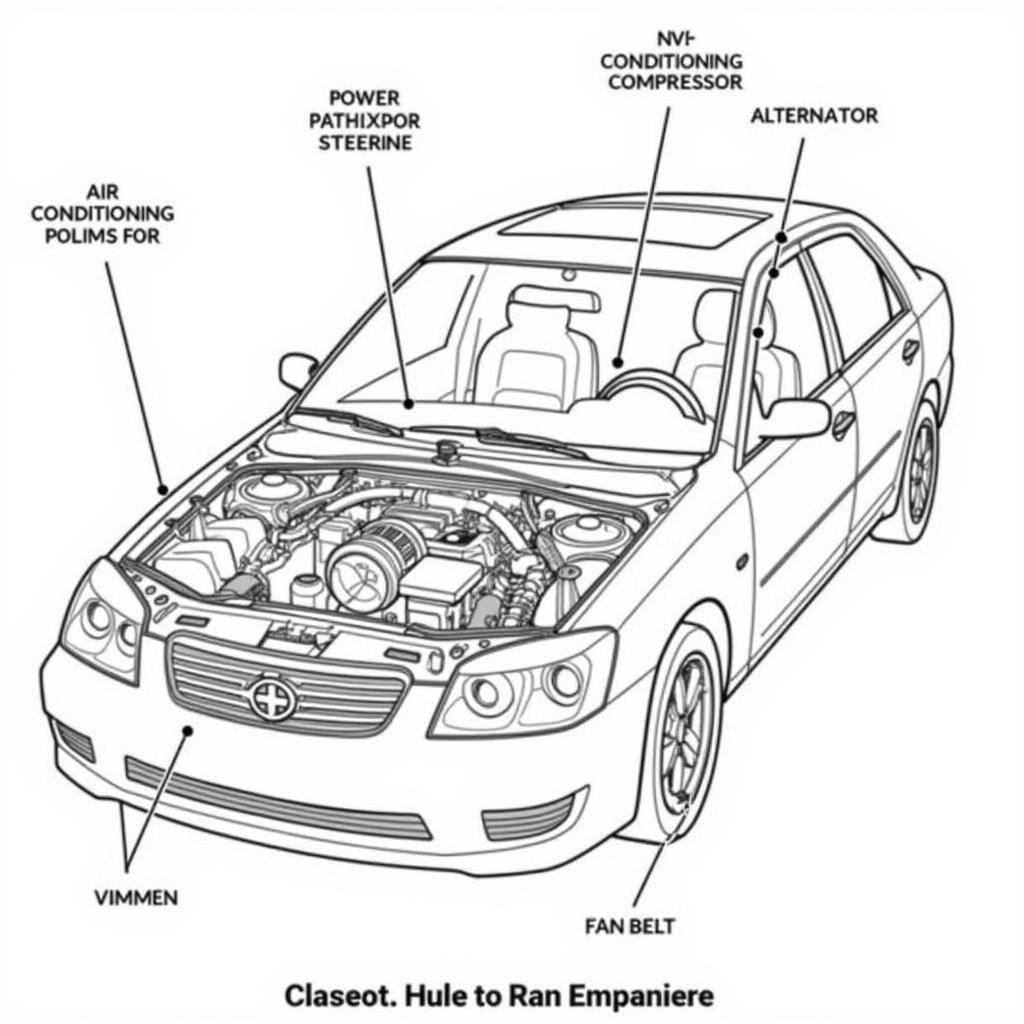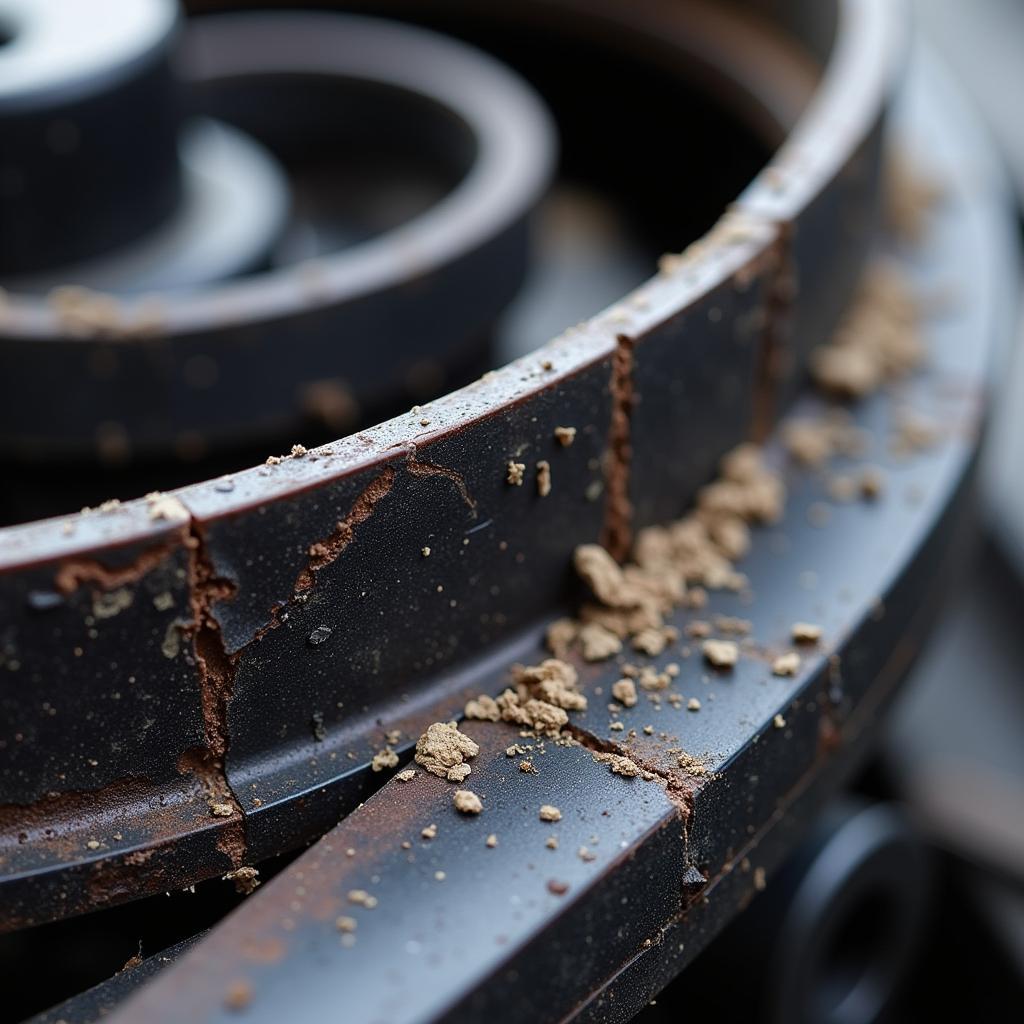A squealing, chirping, or groaning sound coming from your car’s engine bay could be a sign of a worn or loose fan belt, also known as a serpentine belt. This essential component powers crucial accessories like the alternator, power steering pump, and air conditioning compressor. Ignoring these noises can lead to costly repairs or even leave you stranded on the side of the road.
 Car Fan Belt Diagram
Car Fan Belt Diagram
What Causes Car Fan Belt Noise?
Car Fan Belt Noise typically occurs due to friction between the belt and the pulleys it drives. Here are the most common culprits:
- Wear and Tear: Over time, the belt material naturally degrades, leading to cracks, glazing, and loss of tension.
- Misalignment: If the pulleys are not aligned correctly, the belt can rub against their sides, causing noise and premature wear.
- Fluid Leaks: Oil or coolant leaks can contaminate the belt, making it slippery and prone to slippage.
- Worn Pulleys: Damaged or worn-out pulleys can create uneven surfaces that the belt struggles to grip, resulting in noise.
- Belt Tension: A loose belt can slip and squeal, while an overly tight belt can put excessive strain on bearings and other components.
Identifying the Type of Noise
The sound your car makes can provide valuable clues about the underlying issue:
- Chirping: A high-pitched chirping noise, especially upon startup, often indicates a worn or loose belt.
- Squealing: A loud, continuous squealing points towards belt slippage, often due to a loose belt or fluid contamination.
- Groaning: A deep groaning sound, particularly when turning the steering wheel, could mean the power steering pump is struggling due to a slipping belt.
Diagnosing the Problem
While these sounds often indicate a fan belt issue, it’s essential to confirm the diagnosis. Here’s how:
- Visual Inspection: Open the hood and visually inspect the belt for signs of wear, cracks, glazing, or fraying.
- Check Belt Tension: Gently press on the belt between two pulleys. There should be about half an inch to an inch of deflection.
- Inspect Pulleys: Check for any wobble, damage, or roughness on the pulley surfaces.
- Look for Fluid Leaks: Examine the area around the belt and pulleys for any signs of oil or coolant leaks.
 Worn Car Fan Belt
Worn Car Fan Belt
The Importance of Addressing the Issue
Ignoring car fan belt noise can lead to:
- Complete Belt Failure: A broken belt can disable your alternator, power steering, and air conditioning, leaving you stranded.
- Engine Overheating: Without a functioning water pump (driven by the belt), your engine can overheat and suffer severe damage.
- Battery Drainage: A slipping belt can prevent the alternator from charging the battery properly, leading to a dead battery.
Fan Belt Replacement and Cost
If you suspect a problem with your fan belt, it’s crucial to have it inspected by a qualified mechanic. They can determine if the belt needs replacement or if other components require attention.
The cost of fan belt replacement varies depending on the make and model of your vehicle, labor costs, and whether additional components need replacement.
Preventing Future Fan Belt Issues
- Regular Inspections: Have your fan belt inspected during routine maintenance checks, typically every 30,000 to 60,000 miles.
- Address Fluid Leaks Promptly: Fix any oil or coolant leaks immediately to prevent belt contamination.
- Maintain Proper Belt Tension: Ensure the belt tension is within the manufacturer’s specifications.
Frequently Asked Questions about Car Fan Belt Noise
Q: How long does a car fan belt last?
A: Most fan belts are designed to last between 60,000 to 100,000 miles, but it’s crucial to follow the manufacturer’s recommended replacement intervals.
Q: Can I drive with a noisy fan belt?
A: While you might be able to drive a short distance with a noisy fan belt, it’s highly discouraged.
Q: How much does it cost to replace a fan belt?
A: Fan belt replacement costs can range from $100 to $300, including parts and labor.
 Mechanic Inspecting Fan Belt
Mechanic Inspecting Fan Belt
Remember, addressing car fan belt noise promptly can save you from costly repairs and potential roadside emergencies. Regular maintenance and prompt attention to any unusual noises can extend the life of your fan belt and keep your car running smoothly.
For further information on car fans and related topics, you can explore our articles on belt driven axial flow fans and commercial ventilation fan.
If you need expert assistance or have any concerns about your car’s fan belt, don’t hesitate to contact us. Our team of professionals is available 24/7 to provide support and address your queries. You can reach us at Phone Number: 0903426737, Email: fansbongda@gmail.com, or visit us at our address: Group 9, Area 6, Gieng Day Ward, Ha Long City, Gieng Day, Ha Long, Quang Ninh, Vietnam.


